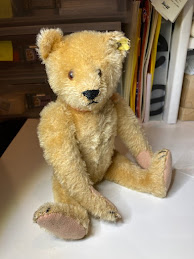This Steiff blog entry is designed to test your "metal" in the most interesting way possible. Check out this delightful and purely period prewar Steiff Ted that Steiffgal has named Hans. He recently joined Steiffgal's hug and previously belonged to a Canadian collector. Can you believe he's close to 90 years old? Indeed, he does check out in every way as a late prewar cub... with a very special and little known detail that helps to narrow down his dating. But more about that in just a bit.
This little love of a cub is a wonderful time capsule of Steiff's mid-1930s to mid-1940s Teddy bear design directives. In terms of his physical properties, Hans stands at 10 inches/25 cm tall and is made from yellow-blonde mohair. He has a back hump, but it is less pronounced than the company's earlier bear editions. He is fully jointed and has both felt hand and foot pads. Each pad is detailed with four black claws. His feet are long and narrow, and his wrists turn slightly upward. Hans' face comes alive with proportional black and brown glass pupil eyes, an unshaven muzzle, and a black hand embroidered nose and mouth. Hans' side-squeeze squeaker works, once in a while.
Hans also has a few "intangible" properties that tie him to the late prewar period. He has a very distinctive long, lean, and somewhat "pensive" appearance. He's a "no nonsense" Ted indeed. This "look and feel" is often seen on Steiff's prewar bear production from the early 1930s onward. It is possible that bears created at this time reflected the feelings of the seamstresses making them, as the 1930s and 1940s were very stressful decades in Germany due to challenging and ongoing social, political, and economic realities. In contrast, consider Steiff's early postwar bear production - from the early 1950s onward. Newly introduced midcentury patterns like Zotty and Jackie and the company's re-engineered "Original Teddy Bears" are noted for their jolly faces, rotund bodies, and playful personalities.
Perhaps the most concrete metric in terms of dating Hans is his unexpected branding. He sports an unusual BRASS colored Steiff button. It is the short trailing "f" style and 6 mm in diameter. This button appeared on a few items from 1933/34 through 1943. He also has traces of his yellow linen ear tag, but the information on it is not legible. The yellow tag was introduced around 1934, which suggests Hans' birth year falls roughly between 1934 and 1943. This is one of a handful of times Steiffgal has ever seen this brass button, and Hans is only the second item in her collection of antique Steiff treasures bearing this distinctive trademark. Most of the time, for items produced in the mid 1930's through early 1940's time frame, Steiff used a silver colored short trailing "f" button. It is possible that Steiff substituted brass buttons for silver colored ones during this time for economic or supply chain reasons, but Steiffgal does not know for certain. Whatever the reason, finding items like Hans with this late prewar branding is a rare and wonderful experience for sure!
Steiffgal hopes this discussion on the company's rarer prewar brass buttons has brought the topic full circle for you.
Have a question about one of your Steiff treasures? Let's talk! Click here to learn more.










